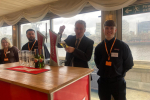
This article was written by Damian Hinds and published in this week's Petersfield Post and Herald editions:
"The three medical development arenas key to getting on top of this terrible virus are vaccines, treatment, and testing. We have had some encouraging news from the vaccine trials - including the announcement this week that a third potential vaccine will begin clinical trials here in the UK - and therapeutic treatments for people with the condition are much better now than in the early stages of the outbreak.
And, despite the set-up challenges, the sheer scale of the Covid-19 testing operation we have now is extraordinary.
The largest diagnostic network the UK has ever seen brings together NHS and other laboratories with capacity for handling 500,000 tests a day. It is supported by more than 600 test locations and the largest outbound call centre in the UK, which has contacted upwards of 1.4 million people with the message to self-isolate.
This is not to claim that reaching this point has been problem-free. But it continues to evolve and will remain one of our most important tools in being able to deal with the virus, particularly when we come out of this lockdown period.
New large-scale testing and rapid testing technologies will scale this up further. There are already pilots running in hospitals, schools and universities, with pilots for the LAMP no-swab saliva test and LAMP asymptomatic testing ongoing in both Southampton and Salford, with our local Hampshire Hospitals NHS Foundation Trust involved in both the development and trialling of the test.
And the first city-wide pilot is now taking place in Liverpool. All residents and workers are being offered testing using a combination of polymerase chain reaction (PCR) swab tests, lateral flow tests (which are similar to pregnancy tests and can turn around results within an hour without the need to be processed in a lab), and new LAMP technology that will be use in Liverpool University Hospitals NHS Foundation Trust for NHS staff.
Care homes in Hampshire are also taking part in another pilot starting this week, offering regular testing to named family and friends. This will enable, where possible, indoor visits without a screen to take place while reducing the risk to care home residents, staff and visitors.
Swab testing capability is also being made available to GPs in England on a voluntary, opt-in basis. This will be a supplementary option for patients who present with symptoms at surgeries and members of the public will continue to be directed to regional testing centres or home testing kits in the first instance.
All of this work should help create a blueprint for the wider roll out of mass and regular testing, but there is also a job to do in scaling up contact tracing and ensuring these data are used to isolate and tackle outbreaks quickly, although 2 million people have now been reached by the NHS Test and Trace service since it was launched.
But more time is still needed for evaluation – there are pros and cons with each of these tests – and to understand how this impacts their scalability. And of course, the system will only prove effective if people come forward for testing when necessary and to self-isolate if the results are positive.
There are now new walk-through testing sites in Aldershot, Basingstoke, Gosport, Havant and Winchester, making it easier for people to access testing closer to home. These remain appointment-only and people will still need to book online or by calling 119, with access to the regional drive-through site near Southampton Airport, mobile units that can move to areas with the greatest demand, and of course home testing kits.
The Prime Minister made it clear that taking local action remains central to the Government’s response, and it intends to revert to a tiered Alert Level approach once the national lockdown ends on the 2nd December.
We know the development of an effective vaccine is still looking positive, but the on-going deployment of the testing system remains key, as does our behaviour.
Science and technology may be a vital part of our armoury against the virus but so is our collective will to stick to the rules. It isn’t easy, but the next few weeks are likely to be critical in determining how well we cope throughout the winter months."


